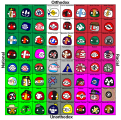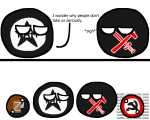 |
This page is about an important IRL ideology "This knowledge is essential to political science!" - Scientocracy This page is about an ideology that not only exists in the real world, but is also of reasonable importance. Please do not make major edits to this page without citing sources, so that it may stay accurate. |
Not to be confused with
Stransserism.
Strasserism is an authoritarian (but usually ![]() anti-totalitarian) and culturally far-right ball, toward the left side of the economic axis.
anti-totalitarian) and culturally far-right ball, toward the left side of the economic axis.
While not as far left as ![]() Nazbol, he supports a socialist economy with strong worker's rights, and is anti-capitalist believing that markets are dominated by those he deems "inferior". He holds anti-semitic and generally racist and "ethnocentric" views, much like but, to an overall lesser degree to
Nazbol, he supports a socialist economy with strong worker's rights, and is anti-capitalist believing that markets are dominated by those he deems "inferior". He holds anti-semitic and generally racist and "ethnocentric" views, much like but, to an overall lesser degree to ![]() Nazism, and enforces these with an authoritarian government.
Nazism, and enforces these with an authoritarian government.
Strasserism varies on being as expansionist and genocidal as National Socialism or favouring a "nationalists of the world unite" approach and favouring everyone's right to a national (worker's) homeland. However, the original proposal put forth by the Strassers, as opposed to the extreme expansionism of the Nazis, was the creation of a United States of Europe, with such proposals as a universal currency and abolition of border checks. The goal of this was to strike a balance between chauvinism of regional identities and the sense of belonging to a greater European civilization.
Strasserism often views bourgeois Jews as less than themselves for more economic reasons than on a racial hierarchy.
Beliefs
Strasserism is a political current that originated within the Nazi Party in Germany during the 1920s. Its main proponents were the brothers Gregor Strasser and Otto Strasser, who had significant ideological differences with Adolf Hitler and his more conservative wing of the party. Although Strasserism never became the dominant faction within the Nazi Party, its beliefs are worthy of analysis.
The beliefs of Strasserism include:
- Anti-capitalism: Strasserists were critical of capitalism and viewed the capitalist economic system as exploitative and harmful to the majority of the population. They advocated for the nationalization of major industries and resources to ensure they were under state control and in the service of the people's welfare.
- Anti-Semitism: Although they shared some ideological similarities with the more conservative wing of the Nazi Party, Strasserists were known for their less radical stance on anti-Semitism. While they accepted certain anti-Semitic elements, they did not embrace the persecution and hatred of Jews to the same extent as Hitler and his more radical followers.
- Nationalism and anti-imperialism: Strasserists advocated for a strong German nationalism and opposed what they saw as Germany's submission to foreign interests, especially during the interwar period after World War I. They also opposed the Treaty of Versailles and the League of Nations.
- National socialism: Strasserists promoted the idea of "national socialism" that combined elements of socialism with nationalism. Their goal was to create a society in which the state played a central role in the economy to protect workers and ensure social equality.
- Rejection of the aristocracy and big industry: Strasserists distrusted the aristocracy and large industrial corporations, viewing them as forces that perpetuated exploitation and the power of economic elites. They advocated for the creation of a more equitable system in which the state regulated the economy and protected the interests of the majority.
- Reject to the Militarism: Strasserism is considered pacifist, as Otto Strasser, in his book "Germany Tomorrow," proposed a pan-national democratic European federation where militarism was renounced.
It is important to note that as the Nazi Party consolidated under the leadership of Adolf Hitler, the Strasserists lost influence and were marginalized. In the infamous "Night of the Long Knives" in 1934, Gregor Strasser was killed on Hitler's orders, marking the end of Strasserism as a significant political current within the Nazi Party.
History
![]() Strasserism is a political and social current that originated within the
Strasserism is a political and social current that originated within the ![]() Nazi movement in
Nazi movement in ![]() Germany during the 1920s. This ideology takes its name from the Strasser brothers,
Germany during the 1920s. This ideology takes its name from the Strasser brothers, ![]() Otto and
Otto and ![]() Gregor, who were prominent leaders of the
Gregor, who were prominent leaders of the ![]() left-wing faction within the Nazi Party in its early years.
left-wing faction within the Nazi Party in its early years.
The Strasserist ideology was characterized by a focus on more radical economic and social issues than those of other Nazi leaders, such as ![]() Adolf Hitler. Strasserists advocated for a more
Adolf Hitler. Strasserists advocated for a more ![]() socialist and
socialist and ![]() anti-capitalist orientation within Nazi politics, promoting policies that would benefit workers and the lower social classes. This included measures like the nationalization of businesses and wealth redistribution.
anti-capitalist orientation within Nazi politics, promoting policies that would benefit workers and the lower social classes. This included measures like the nationalization of businesses and wealth redistribution.
![]() Gregor Strasser in particular was a vocal advocate of these ideas and managed to gain some support within the party, especially among younger members and the working-class base. However, as the party gained influence and moved closer to power,
Gregor Strasser in particular was a vocal advocate of these ideas and managed to gain some support within the party, especially among younger members and the working-class base. However, as the party gained influence and moved closer to power, ![]() Hitler and other more
Hitler and other more ![]() conservative leaders within the party began to view Strasserist ideas as potentially alienating important sectors of German society and industry.
conservative leaders within the party began to view Strasserist ideas as potentially alienating important sectors of German society and industry.
As the Nazi Party solidified its position, internal tensions between the Strasserist faction and the faction led by Hitler escalated. Eventually, during the "Night of the Long Knives" in 1934, Hitler and the more conservative faction eliminated numerous opponents, including several Strasserist leaders like Gregor Strasser, who was assassinated.
After the removal of the Strasserists, the Strasserist ideology ceased to be a significant force within the Nazi Party, and its influence gradually waned over time. Hitler and his more conservative and nationalist vision prevailed in steering the party's direction and shaping Nazi policies.
 Strasser Brothers
Strasser Brothers 
The Strasser Brothers, Gregor and Otto, were prominent figures in the early years of the Nazi Party and played a significant role in its growth and development during the 1920s. However, as the Nazi ideology solidified under the leadership of Adolf Hitler, the Strasser brothers found themselves in disagreement with some of the party's political and strategic directions, which eventually led them to clash with Hitler and lose influence.
Gregor Strasser was born on May 31, 1892, while Otto Strasser was born on September 10, 1897, both in Germany. Both brothers joined the Nazi Party early on, during the early years of the 1920s. Gregor became a prominent member of the party and played a significant role in expanding the party in northern Germany. Along with his brother Otto, he advocated for a more socialist and anti-capitalist approach within the party, often coming into conflict with Adolf Hitler and his more nationalist and anti-Semitic focus.
During the 1920s, the Strasser brothers were part of the more left-leaning faction of the Nazi Party and advocated for policies that promoted social justice and economic equality. However, their influence began to wane as Hitler consolidated his leadership and his vision prevailed within the party.
The rivalry between the Strasser brothers and Hitler reached a critical point during the 1930s. Gregor Strasser was assassinated in 1934 due to his ideological differences and his criticism of Hitler's leadership. After Hitler's rise to power in 1933, Otto Strasser also came into conflict with the Nazi regime and was forced into exile. Otto Strasser continued to criticize the direction the party had taken under Hitler and warned about the dangers of extremism and oppression in the Nazi regime.
After World War II, Otto lived in exile until 1955.
Personality
How to Draw

- Draw a ball
- Draw the Black Front flag, outlined white and colored in red.
- Fill the ball in with black.
- Add the eyes and you're done!
| Color Name | HEX | RGB | |
|---|---|---|---|
| Red | #FF0000 | 255, 0, 0 | |
| Black | #141414 | 20, 20, 20 | |
| White | #FFFFFF | 255, 255, 255 | |
Relationships
Comrades
 National Bolshevism - GANG!
National Bolshevism - GANG! Neosocialism - Also GANG!
Neosocialism - Also GANG! Falangism - Based Syndicalist counterpart from Spain.
Falangism - Based Syndicalist counterpart from Spain. Gaddafism - Very similar in theory to my beliefs (the sensical ones at least).
Gaddafism - Very similar in theory to my beliefs (the sensical ones at least). Ethnopluralism - Every worker deserves a national (worker's) homeland.
Ethnopluralism - Every worker deserves a national (worker's) homeland. Distributism - The best economic system ever made, no communism, no capitalism, equal distribution of property!
Distributism - The best economic system ever made, no communism, no capitalism, equal distribution of property! Corporatism - Great economics, just be more nationalist and you're perfect!
Corporatism - Great economics, just be more nationalist and you're perfect! Guild Socialism - Same as above.
Guild Socialism - Same as above. Jewish-Nazism - Yes, you admit that capitalist bourgeois Jews are the problem, so we welcome you with open arms.
Jewish-Nazism - Yes, you admit that capitalist bourgeois Jews are the problem, so we welcome you with open arms. Ikki Kita Thought - Basically me but in Japan!
Ikki Kita Thought - Basically me but in Japan! European Federalism
European Federalism  - I kinda like what I see here, actually. I would have liked it even more if you didn't turn so progressive and (((capitalist))) recently, though.
- I kinda like what I see here, actually. I would have liked it even more if you didn't turn so progressive and (((capitalist))) recently, though. National Agrarianism - Germany must be re-agrarianized!
National Agrarianism - Germany must be re-agrarianized!
Frenemies
 Nazism - I love you brother, but you're a backstabbing son of a bitch. Also stop hating on Slavs!
Nazism - I love you brother, but you're a backstabbing son of a bitch. Also stop hating on Slavs! National Communism - More left than I am and he pretends to hate me for being fascistic but we are closer than he thinks.
National Communism - More left than I am and he pretends to hate me for being fascistic but we are closer than he thinks. Conservative Socialism,
Conservative Socialism,  Left-Wing Nationalism &
Left-Wing Nationalism &  Welfare Chauvinism - Way too moderate.
Welfare Chauvinism - Way too moderate. Marxism–Leninism - Can't say I like how progressive you've become but back then I swear I wouldn't have backstabbed you if we signed the pact.
Marxism–Leninism - Can't say I like how progressive you've become but back then I swear I wouldn't have backstabbed you if we signed the pact. Trotskyism - I was betrayed like you, too...
Trotskyism - I was betrayed like you, too... But you still suck Socialism - Why do you shun me so?
Socialism - Why do you shun me so? Nationalism - Same as above.
Nationalism - Same as above. Paternalistic Conservatism - Good candidate for Strasserist radicalization.
Paternalistic Conservatism - Good candidate for Strasserist radicalization. Juche - Basically national socialism, but even your autarky is extreme for me.
Juche - Basically national socialism, but even your autarky is extreme for me. Dengism - Occupies a similar region to me on the political compass, just be less friendly to Israel and you are good.
Dengism - Occupies a similar region to me on the political compass, just be less friendly to Israel and you are good. Reactionary Socialism - You have based ideas but you take it waaaaay too far.
Reactionary Socialism - You have based ideas but you take it waaaaay too far. National Anarchism - I like your anti-capitalism and social views, but get a state anarkiddy.
National Anarchism - I like your anti-capitalism and social views, but get a state anarkiddy. Lawsonomy - Based bank-hating and leftism but you're a very big idiot.
Lawsonomy - Based bank-hating and leftism but you're a very big idiot. Bull Moose Progressivism - Good job breaking those (((Bankers))), but why are you progressive?
Bull Moose Progressivism - Good job breaking those (((Bankers))), but why are you progressive? African Socialism &
African Socialism &  Maoism–Third Worldism - I swear, it's my modern followers that are racist. In reality, I support anti-imperialism in colonial states.
Maoism–Third Worldism - I swear, it's my modern followers that are racist. In reality, I support anti-imperialism in colonial states. Pol Potism - I can always appreciate a fellow socialist nationalist, and what you did with the banks was based, but you're f*cking insane.
Pol Potism - I can always appreciate a fellow socialist nationalist, and what you did with the banks was based, but you're f*cking insane. Fascism - Gregor likes you but Otto hates you.
Fascism - Gregor likes you but Otto hates you. Zionism - At least your
Zionism - At least your  worker class is acceptable...
worker class is acceptable... Stransserism - Why is my son such a degenerate?
Stransserism - Why is my son such a degenerate? Fourth Theory - Listen, man, I'm also against Anglo-American capitalist hegemony, I don't like (((Soros))) and I'm more friendly to Slavs than
Fourth Theory - Listen, man, I'm also against Anglo-American capitalist hegemony, I don't like (((Soros))) and I'm more friendly to Slavs than  my right-wing former mate. Why don't you like me?
my right-wing former mate. Why don't you like me?
(((Bankers)))
 Capitalism - (((Bankers))).
Capitalism - (((Bankers))). Financialism - More (((Bankers))).
Financialism - More (((Bankers))). Corporatocracy - Even more (((Bankers))).
Corporatocracy - Even more (((Bankers))). Timocracy - Super (((Bankers))).
Timocracy - Super (((Bankers))). Plutocracy - Mega (((Bankers))). *Creates conspiracy theories that he's bourgeois jewish.*
Plutocracy - Mega (((Bankers))). *Creates conspiracy theories that he's bourgeois jewish.* Kleptocracy - Actual (((Bankers))).
Kleptocracy - Actual (((Bankers))). Pink Capitalism -
Pink Capitalism -  Neolibtard supporting (((Bankers))).
Neolibtard supporting (((Bankers))). Anarcho-Capitalism - Stateless (((Bankers))), your theorist is literally a bourgeois Jew.
Anarcho-Capitalism - Stateless (((Bankers))), your theorist is literally a bourgeois Jew. Neoconservatism - Literally a puppet of the (((Bankers)))
Neoconservatism - Literally a puppet of the (((Bankers))) National Capitalism - I already hardly tolerate his
National Capitalism - I already hardly tolerate his  wishy-washy economics, but this is too liberal and too capitalist for my liking.
wishy-washy economics, but this is too liberal and too capitalist for my liking. Esoteric Fascism - Damn the SS for sidelining the SA.
Esoteric Fascism - Damn the SS for sidelining the SA. Kahanism - "Greater Israel"? Nope!
Kahanism - "Greater Israel"? Nope! Neoliberalism - Capitalist, globalist and progressive. I think I'm going to vomit...
Neoliberalism - Capitalist, globalist and progressive. I think I'm going to vomit... State Liberalism - Neoliberalism 2.0? I'm going to vomit even more!
State Liberalism - Neoliberalism 2.0? I'm going to vomit even more! Anarcho-Communism - Anarkiddy who really hates me and calls me red fash.
Anarcho-Communism - Anarkiddy who really hates me and calls me red fash. Anti-Fascism - Anarkiddy 2.0? You make me laugh.
Anti-Fascism - Anarkiddy 2.0? You make me laugh. At least you like my traitorous partner even less. Objectivism - My opposite and is one of (((them))), truly evil.
Objectivism - My opposite and is one of (((them))), truly evil.
Further Information
Literature
- Construction of German Socialism by Otto Strasser
- Germany Tomorrow by Otto Strasser
- Hitler and I by Otto Strasser
- National Socialism: A Left Wing Movement by Povl Riis-Knudsen
Wikipedia
- Strasserism
- Black Front
- Gregor Strasser
- Otto Strasser
- Freiheitliche Deutsche Arbeiterpartei
- Autonome Nationalisten
- Free-Germany Movement
Video
Gallery
-
-
-
Credit: u/brutal_player, Source
-
Credit: u/KloggKimball
-
Credit:
 TheLegend2T, Source
TheLegend2T, Source
-
Credit:
 TheLegend2T, Source
TheLegend2T, Source
-
Credit to u/BiologicalFunfare
-
-
u/Vizdun
-
-
Original image
| | |
| | |
| Main Related Self-Inserts | |
| Main Definitions Application Related Other Ideologies Self-Inserts | |
Self-Inserts | |
| | |
| • | |
- ↑ Strasserism originally began as a fascist movement however Otto Strasser would later denounce Fascism and Nazism in his book Germany Tommorow
- ↑ “We are Christians; without Christianity Europe is lost. Hitler is an atheist.” —Otto Strasser
- ↑ Strasserism embraced anti-imperialism, advocating for the right to self-determination for all races, cultures, and states. Strasser promoted the decentralization of Germany, envisioning the nation as a collection of distinct, self-governing autonomous communities. Although each region would practice the same guild socialist economic model and uphold German culture, a grand council would be established to ensure checks and balances on the executive.











